‘I will return to the US in an urn’: She moved to Portugal with her husband two years ago, and this American woman says she’s never coming back
8 min readCNN
—
They’d always planned to retire somewhere outside the US, but when the Covid-19 pandemic hit in 2020, Cynthia Wilson and her husband Craig Bjork felt compelled to bring their plans forward.
The couple, who married in 2009, had already chosen Portugal as their intended destination after Googling “best places for Americans to retire to” and finding that the European country – a place Wilson had never visited – was high on the list.
“It’s funny because I’ve been to like 33 countries, and almost all of northwest Europe,” Wilson, originally from Seattle, tells CNN Travel. “I’ve been to countries like Estonia, but I almost knew nothing about Portugal.
‘Aha’ moment
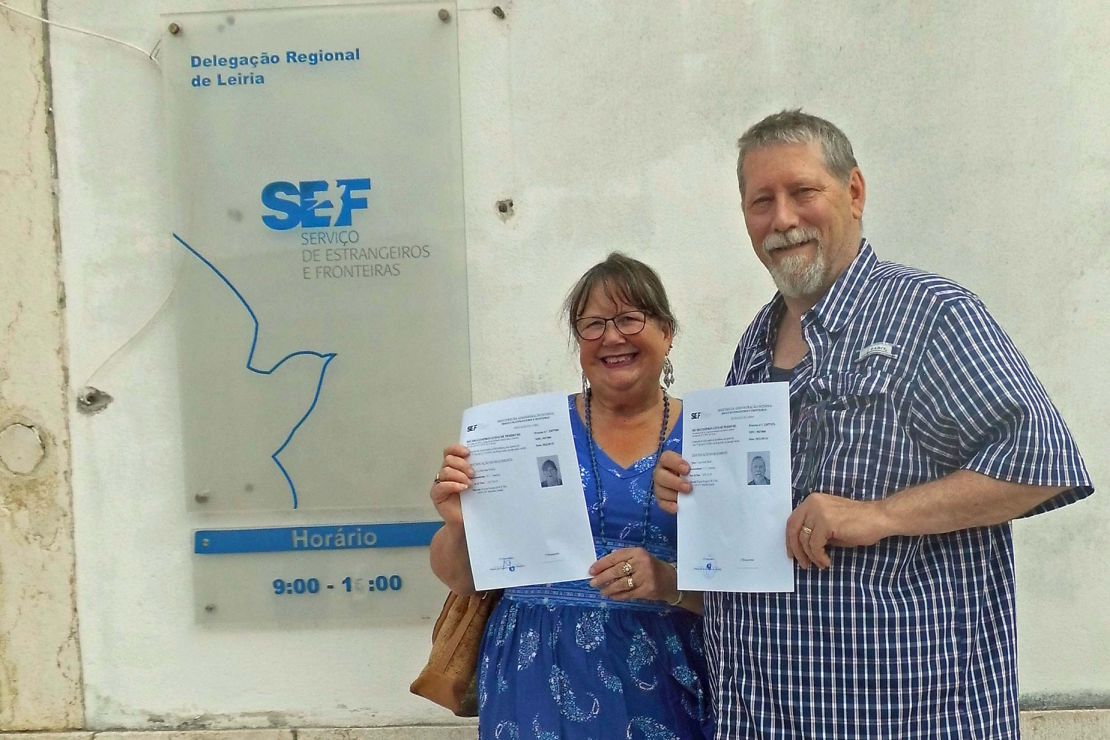
Thankfully, her husband, a former US marine, “knew everything about it.”
“It was an ‘Aha’ moment for me,” says the retired chef and restaurant owner, explaining that Bjork was stationed in Lisbon during the late 1970s and “had regaled me with stories about his life there.”
The couple, who met when they were both in their 50s, initially bonded over their love for travel, and Wilson says that it’s been a “never ending conversation” ever since.
“We started talking about our travels,” she recounts. “And we still are talking about our travels.”
Once they were married, Wilson and Bjork, who were based in Kansas at the time, began to think more seriously about the type of life that they wanted to have during their retirement years.
“We were both watching our parents spend their entire savings and pensions on medical care,” says Wilson, explaining that they did a lot of research into the cost of living in Portugal and found it to be more favorable.
“And, in Portugal, we could keep our money for travel. We were required to have private medical insurance as part of the visa process.
“But we also would have access to the national system, particularly for hospitalizations.”
Wilson and Bjork, who previously ran a food truck named LumpiaPalooza and the Parsnipity Cafe in Wichita, Kansas, initially gave themselves six years “to plan and dream about moving to Portugal.”
However, they opted to speed things up “rather than to go into debt to keep the business alive” during the pandemic.
“We decided to retire two years early,” explains Wilson. “So we retired in 2020 and started the paperwork.”
The couple applied for a D7 visa, also known as the “Retirement visa,” which required them to meet specific requirements, including either proof of purchase of a property in the country or a rental agreement of at least 12 months.
Community spirit
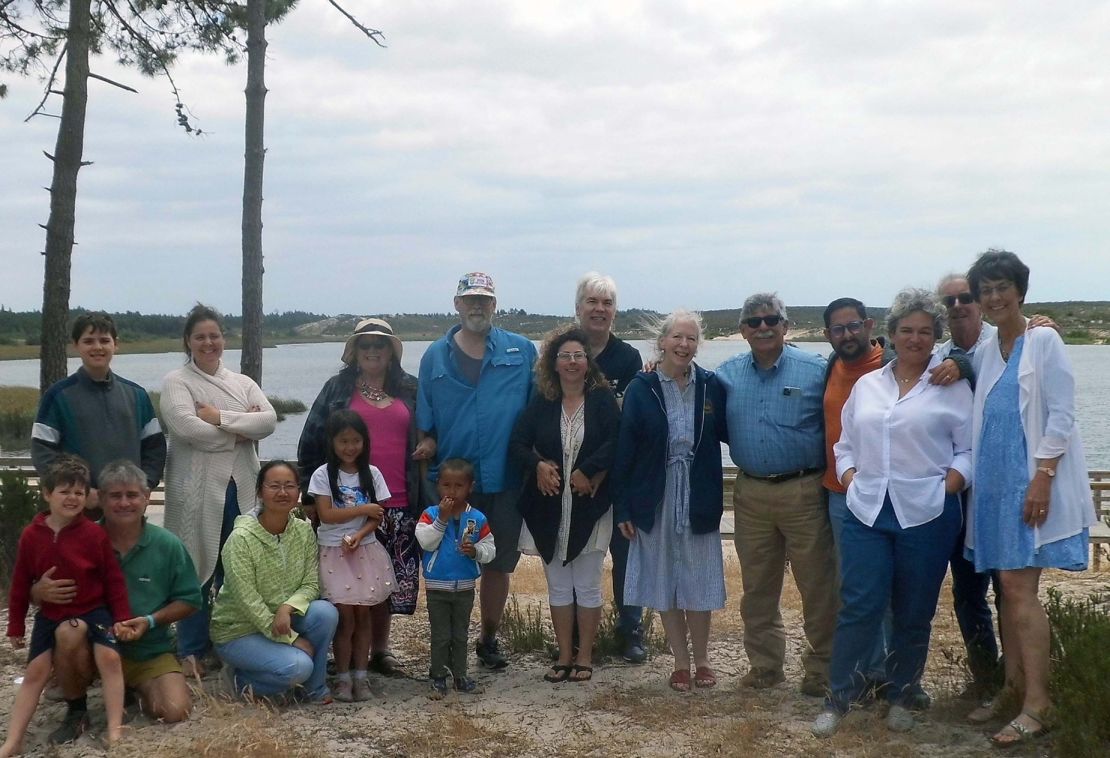
They put a lot of time and energy into choosing which town to live in, eventually settling on the small town of Marinha Grande, located on the Silver Coast close to famed surfing beach Nazare.
Wilson explains that they were keen to move somewhere that they could integrate themselves into the local community and spend time with Portuguese people rather than other Americans.
“Many people moving to Portugal like to call themselves ‘expats’ and spend their time at ‘Meetups’ where they can whine to other ‘expats’ about how no one in Portugal speaks English, how they can’t find their exact brand of tinned beans and accuse the ‘natives’ of being impossible to get to know,” she says.
“This was not the life we wanted. We wanted to be immigrants, people moving to a new country to become a part of their culture and community.”
Once their visa had been approved and border restrictions had lifted, the couple moved to Marinha Grande, which has a population of just under 40,000, in January 2022.
They initially stayed in an Airbnb, which cost them around $800 per month, and soon found themselves hosting some of the friends they’d connected with via a town Facebook page before traveling over.
“I was cooking dinner out of our Airbnb two or three times a week for my Portuguese friends,” says Wilson, before adding that they were warmly received by the locals, who seemed intrigued by them.
“People never pegged us as Americans,” says Wilson. “I think they can’t peg us at all. We seldom get guessed as Americans, and we’re fine with that.”
As the couple began to settle into their new lives, Wilson, who describes herself as an “over-achiever,” struggled with having so much time on her hands.
Early retirement
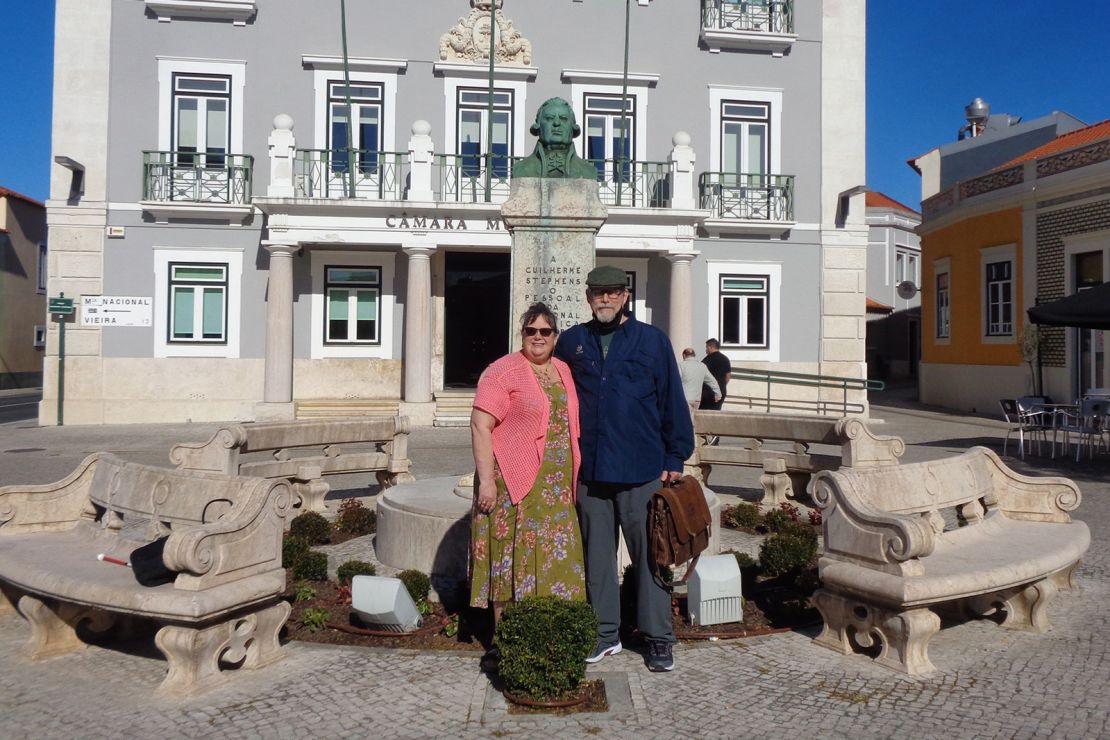
“Retirement’s been hard for me,” she admits. “Because I’m a ‘Type A’ person. My entire life has been work, work, work. I have a list and I live by the list.
“And now it’s like, I don’t even know what day of the week it is. And that’s been a struggle.
“But I’m in the right place for that. Because that’s kind of OK here. No one looks down at me because I’m not racing all over the world and achieving, achieving and achieving.”
Wilson and Bjork are both currently taking Portuguese language classes provided by the government. However, Wilson admits that she hasn’t found learning a new language easy.
“Portuguese, the language is very hard,” says Wilson, explaining that she speaks Japanese and Spanish as well as “tourist German, Danish and French.”
“I’m really good at languages. But Portuguese is a challenge to learn.
“We don’t find it easy. We find it manageable. Some people, especially people our age, don’t find it manageable.”
The couple have also had to change the way that they approach people, particularly while asking for things at shops, after noticing that their direct manner wasn’t being received well.
“My Portuguese friends taught me that you have to first recognize their humanity,” says Wilson.
“And you do this by saying, ‘Good morning. How are you?’ And they say, ‘I’m well. Are you well?’ And once you’ve done that, it’s like a magic key that will open good service up to you.”
Wilson goes on to explain that she finds this attitude refreshing, as the focus is firmly on people and personal relationships.
“Their ethic is not job first, or money first,” she adds. “Their ethic is family and leisure…
“So that’s refreshing, to see people valuing relationships above the rat race. The rat died here. There’s no place for that.”
Wilson has warmly embraced the Portuguese way of life, particularly the focus on food, which has long been a big part of her life.
“The people eat together all the time,” she says. “Sunday is considered family day. So there’s a big family meal at everybody’s mom or dad’s house and everybody gathers together and eats.
“Portuguese women my age are always cooking. I’ve spent a lot of time with them learning Portuguese food.”
While Wilson and Bjork had originally planned to use Portugal as a “jumping off point” to travel around the rest of Europe, they’ve been too busy dealing with all of the tasks that come with relocating to a new country to venture very far.
“There’s a lot to it,” says Wilson. “From governmental stuff, getting your residency card. Then you have to transfer your driver’s license and find a car [if you drive].
“You have to buy everything [for your house]. And you have to set up yourself with medical and utilities. Really, it’s a huge process.”
Affordability factor
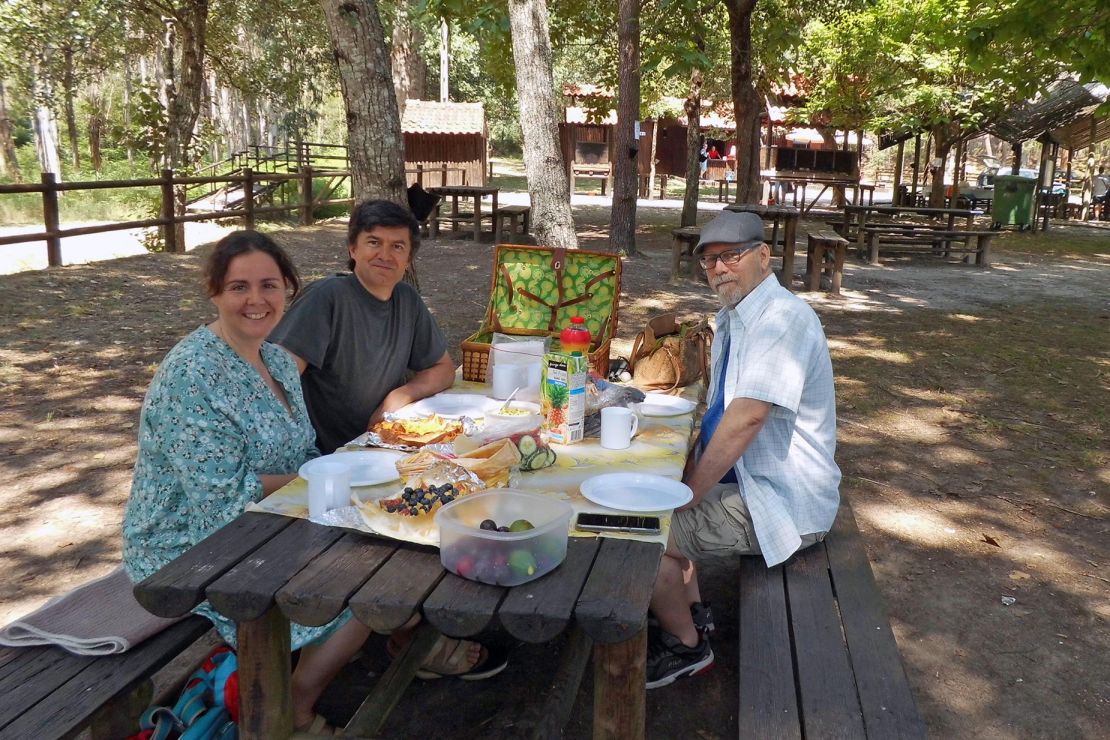
When asked if she and her husband have found Portugal to be more affordable, Wilson points out that this is all relative to their own experiences, noting their Portuguese friends “push back a little” if they comment on how much cheaper things are, as it’s not necessarily cheap for them.
“We made that mistake,” she admits. “When we first came, we were like, ‘Oh it’s practically free.’ And we had to quit doing that, because it was offending them [their friends].”
She points out that what seems very affordable to them, may not be to affordable to a Portuguese worker earning minimum wage.
“A lot of people make minimum wage,” she adds. “So that being said… Yes. For Americans, it is cheaper to live here, if you don’t live in Lisbon, Porto or the Algarve.
“Those places are like trying to live in San Francisco or Manhattan. Those are expensive cities.
“So if you have your heart set on living in one of those places, you’re going to pay three times what we pay, probably. In rent, food, everything.”
During their time in Portugal, the pair have adopted two rescue cats, grandly named Rainha Doce Florabela de Portugal and Rainha Joia Fofa Maria da Silva, through nonprofit organization The Kitten Connection.
Wilson will be making snacks for an upcoming fundraising event for the organization and has also been giving regular cooking lessons to a local teenager.
“He loves Asian food and it’s not that easy to get here in Marinha Grande,” she explains. “So we got the idea of him learning from me.”
She and her husband regularly host dinner parties, including an annual Thanksgiving celebration, and attend local events, such as children’s concerts and sports games.
Being a part of such a close-knit community has been a dream come true for Wilson, who says that they nearly always bump into someone they know while out and about.
“We have been here for over two years and grow happier every day with our decision,” adds Wilson.
“We have a wealth of Portuguese friends who have helped us every step of the way and opened the doors to their homes and hearts to us.”
‘Zero problems’
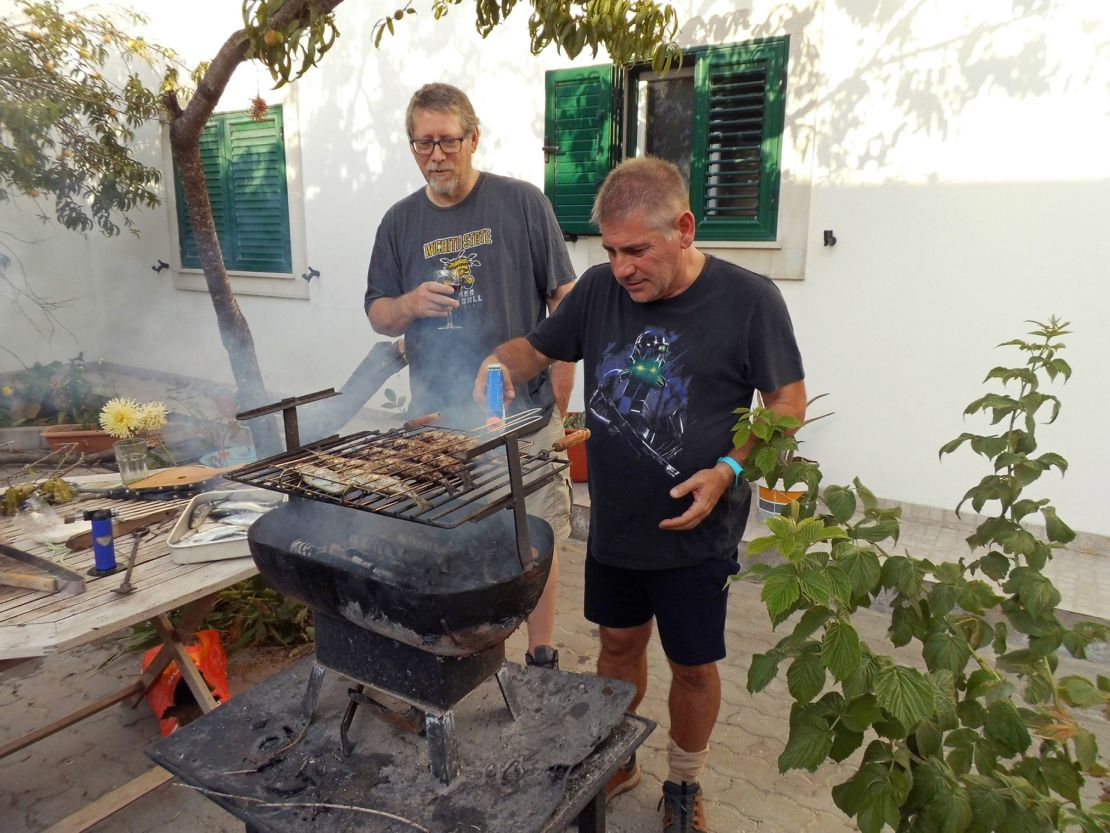
Wilson had become incredibly jaded by the political climate in the US before relocating, and was particularly concerned about gun violence.
“I tell people, ‘We fled the country,” she says. “The way everything was heading… We felt outraged and enraged every minute of the day.”
She hasn’t been back for a visit since moving to Portugal and says she has no plans to ever return.
“I will return to the US in an urn. Period,” she stresses. “There’s literally nothing that would compel me to return to the US.”
While Wilson misses her family and friends, she says that she’s an adventurer at heart and never intended to spend the rest of her days in America.
“Some people asked how I could leave my children or what my children think about it.” she says, stressing that her children are grown ups living their own lives.
“And I have traveled my whole life on my own, leaving my children and my husband to travel for two weeks a year, every year. Just because it was that important to me.
“And I’m a little bit of a bohemian type of person. So my kids expected nothing less than [me] going out this way. Doing something odd.”
Wilson and Bjork say that they’ve had “zero problems” since relocating to Portugal and couldn’t be happier.
In fact, things have gone so well that others are sometimes skeptical when they recount their experiences.
“People are like, ‘You just see everything through rose-colored glasses.’ But everything is as perfect as I say,” says Wilson.
“It has unfolded without any problems for us. It doesn’t happen that way for everyone – I know that. But I’m going to celebrate what we got. And we got a great experience.”



